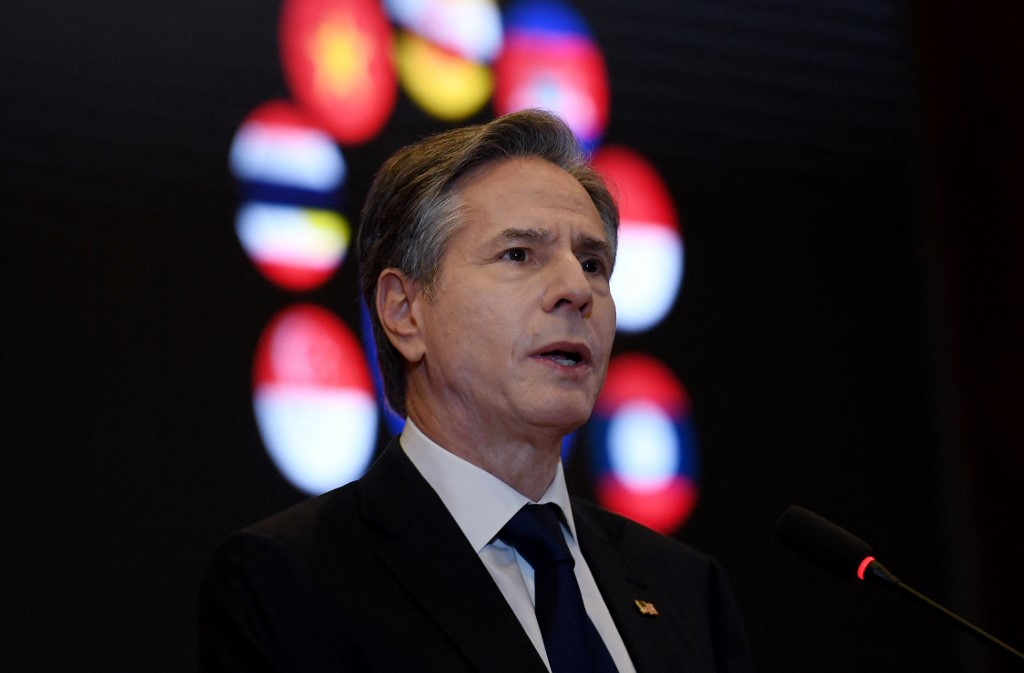Popular Reads
Top Results
Can't find what you're looking for?
View all search resultsPopular Reads
Top Results
Can't find what you're looking for?
View all search resultsIndonesia navigating between the US and China
It is imperative for Indonesia to forge a close relationship with the US, China and other extra-regional powers such Japan, South Korea, Australia, India, the United Kingdom and the European Union.
Change text size
Gift Premium Articles
to Anyone
U
nited States Secretary of State Antony Blinken's recent visit to Indonesia was expected by many to serve as a fresh start to reinvigorate US-Indonesia relations. Questions were asked, however, whether the US would now seriously work with Indonesia to build a real strategic partnership between the two countries.
After all, many Indonesians became skeptical when the agreement to build a strategic partnership — reached between then-president Barrack Obama and President Joko "Jokowi" Widodo in 2015 — went dormant after Donald Trump became president in 2017. And, given the state of American domestic politics, the prospect of Trump returning to power in 2024 cannot be underestimated.
Building the foundation for stronger ties between the US and Indonesia, however, should not be constrained by political uncertainties in the US. That is why, on the occasion of Blinken’s visit, both countries renewed their commitment to cooperating closer by signing a number of agreements.
The two signed a memorandum of understanding (MoU) on the Extension of Maritime Cooperation, which includes maritime security cooperation. They also agreed to strengthen security cooperation by establishing a two-plus-two dialog mechanism between senior officials from ministries of foreign affairs and defense. More importantly, the two countries promised to increase economic cooperation and cooperate further on other important issues such as climate change, public health and education.
From the geopolitical perspective, Blinken’s visit is seen as part of Washington’s attempt to reclaim its strategic position in Southeast Asia. The US believes that China’s strategic influence in Southeast Asia has grown considerably. That influence will continue to deepen to the point of presenting a serious challenge to US strategic interests.
And as President Biden has declared that the US is now engaged in a strategic competition with China, Indonesia is seen as a key player in Southeast Asia with whom the US has not engaged closely within the context of its rivalry with China.
Indeed, Ben Bland of the Lowy Institute has pointed out in his New York Times (NYT) opinion, that a non-aligned Indonesia is vital “in the geopolitical contest of our time between the United States and China” and, therefore, urged the US to use Secretary Blinken’s visit “to kick start a sustained charm offensive to bring the world’s third-largest democracy closer”.
It seems that Indonesians appreciate Bland’s suggestion. Like his book on President Jokowi last year, Bland’s NYT op-ed went viral in many WhatsApp groups in Indonesia. Indeed, Indonesians clearly appreciate any suggestion that their country should remain independent and yet active in international affairs.
Appreciations expressed by Indonesian officials and commentators after the visit clearly suggest and display a genuine expectation that Indonesians also want to have better and closer ties with the US. Critics even long for the day when the US no longer ignores this third-largest democracy (Tama Salim, The Jakarta Post, Dec. 16).
Indonesia is interested in the US, but it is still not sure if the US is seriously interested in Indonesia. Even if the current administration is interested in Indonesia, the next one might not even bother to check the map where Indonesia is located. In other words, the US will need to convince Indonesia and other countries in Southeast Asia that it is really back and would act as a permanent, not part time, power in the region.
The willingness to improve relations and strengthen cooperation with the US does not mean that Indonesia is interested in becoming part of the US-led coalition in the US-China rivalry. For Indonesia, especially the current administration, China is an important economic partner. China is now the largest trading partner and an important source of investment for Indonesia. More importantly, the Jokowi government relies on China’s supports for its focus on infrastructure developments.
The US should not misread this growing relationship with China as a sign of fundamental change in Indonesia’s foreign policy. It merely reflects the fact that some of Indonesia’s national interests can be fulfilled through cooperation with China. The US, and also China, should understand that Indonesia would never become a client state of any big power. In fact, recent developments in Indonesia’s relations with China clearly suggest the complex and sensitive nature of bilateral ties between the two countries.
Jakarta, for example, is puzzled by China’s behavior within Indonesia’s Exclusive Economic Zone (EEZ) in the North Natuna Sea when Beijing reportedly told Indonesia to stop drilling for oil and natural gas in the area. The repeated incursions of China’s survey vessels into Indonesia’s EEZ have also caused concerns and raised questions in Jakarta. China should understand that Indonesia is a friend and should not be turned into a foe.
Both Jakarta and Beijing should learn from history that bilateral ties between the two countries need to be nurtured and managed delicately. In other words, Indonesia and China should never take their bilateral relationship for granted.
As for Indonesia, the choice is clear. In navigating the US-China rivalry, it must put its own national interests first. In that context, it is imperative for Indonesia to forge a close relationship with the US, China and other extra-regional powers, such as Japan, South Korea, Australia, India, the United Kingdom and the European Union.
Such diversification of international engagements would clearly reduce excessive reliance on one particular power. After all, Indonesia’s strategic autonomy and ASEAN’s resilience and centrality will be in everyone’s interest.
***
The writer is a senior fellow at the Centre for Strategic and International Studies (CSIS), Jakarta, and former Indonesian ambassador to the United Kingdom, Ireland and the International Maritime Organization (IMO).










